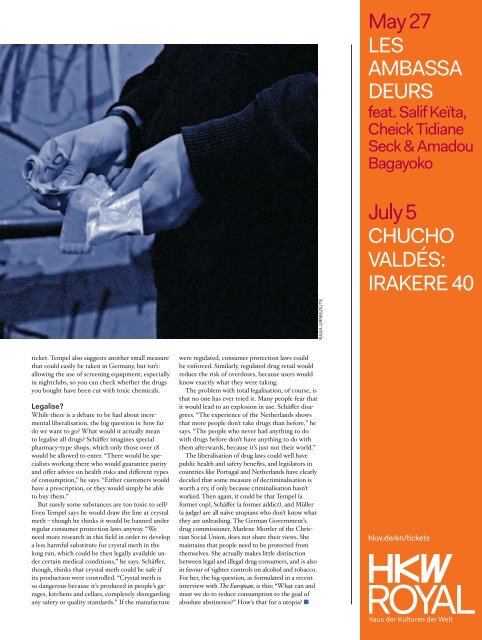You also want an ePaper? Increase the reach of your titles
YUMPU automatically turns print PDFs into web optimized ePapers that Google loves.
RASA URNIEZIUTE<br />
ticket. Tempel also suggests another small measure<br />
that could easily be taken in Germany, but isn’t:<br />
allowing the use of screening equipment, especially<br />
in nightclubs, so you can check whether the drugs<br />
you bought have been cut with toxic chemicals.<br />
Legalise?<br />
While there is a debate to be had about incremental<br />
liberalisation, the big question is: how far<br />
do we want to go? What would it actually mean<br />
to legalise all drugs? Schäffer imagines special<br />
pharmacy-type shops, which only those over 18<br />
would be allowed to enter. “There would be specialists<br />
working there who would guarantee purity<br />
and offer advice on health risks and different types<br />
of consumption,” he says. “Either customers would<br />
have a prescription, or they would simply be able<br />
to buy them.”<br />
But surely some substances are too toxic to sell?<br />
Even Tempel says he would draw the line at crystal<br />
meth – though he thinks it would be banned under<br />
regular consumer protection laws anyway. “We<br />
need more research in this field in order to develop<br />
a less harmful substitute for crystal meth in the<br />
long run, which could be then legally available under<br />
certain medical conditions,” he says. Schäffer,<br />
though, thinks that crystal meth could be safe if<br />
its production were controlled. “Crystal meth is<br />
so dangerous because it’s produced in people’s garages,<br />
kitchens and cellars, completely disregarding<br />
any safety or quality standards.” If the manufacture<br />
were regulated, consumer protection laws could<br />
be enforced. Similarly, regulated drug retail would<br />
reduce the risk of overdoses, because users would<br />
know exactly what they were taking.<br />
The problem with total legalisation, of course, is<br />
that no one has ever tried it. Many people fear that<br />
it would lead to an explosion in use. Schäffer disagrees.<br />
“The experience of the Netherlands shows<br />
that more people don’t take drugs than before,” he<br />
says. “The people who never had anything to do<br />
with drugs before don’t have anything to do with<br />
them afterwards, because it’s just not their world.”<br />
The liberalisation of drug laws could well have<br />
public health and safety benefits, and legislators in<br />
countries like Portugal and Netherlands have clearly<br />
decided that some measure of decriminalisation is<br />
worth a try, if only because criminalisation hasn’t<br />
worked. Then again, it could be that Tempel (a<br />
former cop), Schäffer (a former addict), and Müller<br />
(a judge) are all naïve utopians who don't know what<br />
they are unleashing. The German Government’s<br />
drug commissioner, Marlene Mortler of the Christian<br />
Social Union, does not share their views. She<br />
maintains that people need to be protected from<br />
themselves. She actually makes little distinction<br />
between legal and illegal drug consumers, and is also<br />
in favour of tighter controls on alcohol and tobacco.<br />
For her, the big question, as formulated in a recent<br />
interview with The European, is this: “What can and<br />
must we do to reduce consumption to the goal of<br />
absolute abstinence?” How's that for a utopia? n<br />
13


















